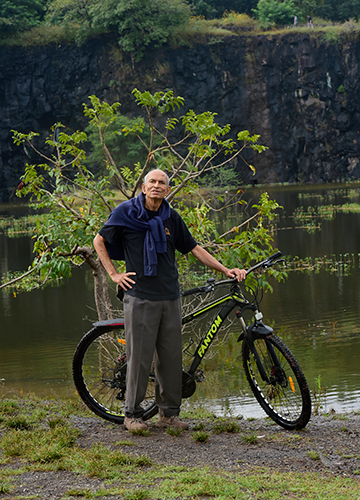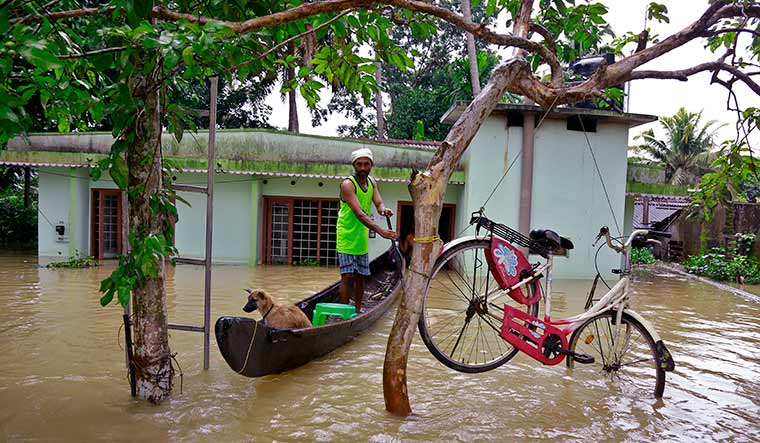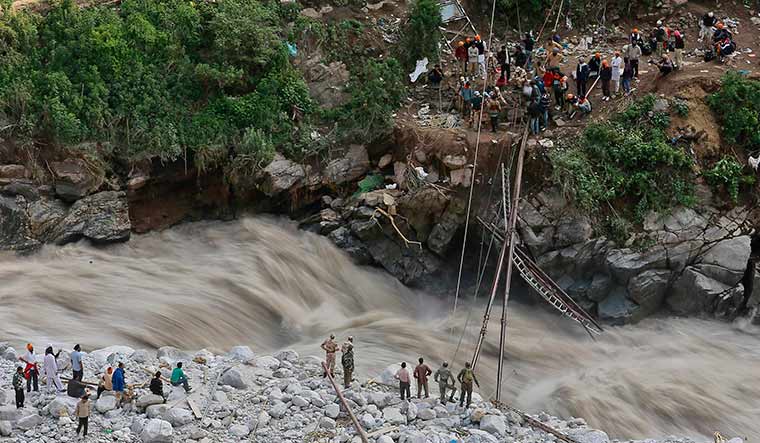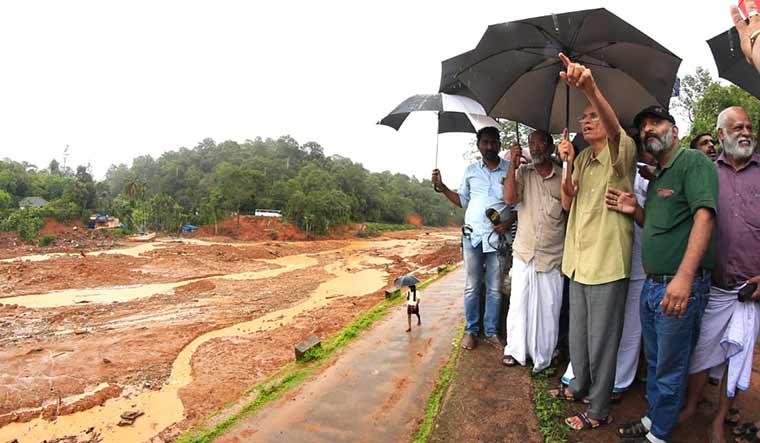Q/What is the future of the Western Ghats?
A/There will be increasing destruction of the soil, rocks and water cycle of the Western Ghats. This will seriously affect the productivity of agriculture, forests and fisheries. Since 70 per cent of Indians depend on the natural resources of their surroundings for their well-being, this would lead to deterioration in their health and nutrition. There will be increasing floods and consequent damage to agriculture and property, both on the western coastal lands and the plains of Tamil Nadu and the Deccan Plateau. A small minority of people will get richer and share this wealth with a corrupt bureaucratic and political system. As the disparity grows, this minority will become more powerful and suppress popular dissent. Our democracy will suffer.
Q/What are your major concerns regarding India's environment? Which regions worry you most?
A/Increasing air and water pollution, soil erosion, destruction of watersheds and consequent worsening of floods, continuing depletion of groundwater, flight of people from rural areas as their livelihoods are destroyed, continuous growth of urban slums alongside high-rise buildings for the rich, and a huge increase in automobiles, are all matters of concern. Often, there are large-scale fish mortalities as our rivers are so polluted. The melting of the Himalayan glaciers is a serious issue. Also, sea levels are rising at an alarming speed. Many cities, including Mumbai and Kochi, will be adversely affected. We are possibly reaching a tipping point at which any further degradation of the environment will trigger a series of disasters year after year.
Q/What are the solutions to these problems?
A/As 16-year-old Swedish climate activist Greta Thunberg said: “We cannot solve a crisis without treating it as a crisis, and if solutions within the system are so impossible to find, we should change the system itself.” Surely there is a great deal of substance in what she said, and we must now embrace radically new policies in India, which could include some of the following elements:
¨ No further disturbance of any water courses ¨ No further destruction of the remaining natural vegetation
¨ No further addition to the urban heat islands
¨ No further addition of aerosols to our atmosphere
Q/What measures should the government take?
A/It should strengthen the democratic process and establish the rule of law. Today, governments are continually engaged in suppressing democratic dissent and violating all pro-people and pro-environment laws. We have a deep-rooted democracy, and politicians are obliged to take people's concerns into consideration. Once people at the grassroots are empowered, they will promote environment friendly and genuinely sustainable development, and things will automatically begin to move in the right direction.
Q/Is climate change for real? Some people don't seem to think so.
A/It is very much real, and there is abundant scientific evidence to prove it. Climate change is no longer an abstract threat lurking in the distant future. The world is decidedly getting warmer. Hence, there is more water vapour in the air, leading to more frequent and intense rainfall. This results in more floods, which increase the chances of landslides, breaching of bunds and collapse of buildings. Melting glaciers and rising sea levels are submerging coastal areas. Only those with vested interests in continuing business as usual and their champions, like US President Donald Trump, would deny it.
Q/There is a contradiction between developmental aspirations and environmental protection. Are there ways to connect both?
A/What have common people gained with the ongoing lopsided development? We have been engaged in economic growth but the overall well-being of people is deteriorating. The WGEEP (Western Ghats Ecology Expert Panel) Report explicitly emphasises that development and conservation must not be exclusive and must take people's concerns on board. This is the vital step needed to ensure that this false contradiction between environment and development is removed.
Q/You say that decentralisation of power is the way forward. Won't this lead to decentralisation of corruption too?
A/When the rot of corruption has crept into our entire political, economic and social system, it has inevitably crept into decentralisation of governance too. However, all objective evidence shows that corruption is lower at the level of the gram sabha and gram panchayat, and becomes more virulent at higher levels of governance. A panchayat member has to face people on a daily basis, hence will be held more accountable than an MP or MLA. We must therefore strive to devolve more power to lower levels, with the ultimate aim of moving towards direct democracy, like in the cantons of Switzerland.
Q/Critics of the report say that it was rejected for being unrealistic and overambitious.
A/The experience of the Kasturirangan panel has proved that this is not true. It did everything possible to dilute the report, presumably making it more realistic and less ambitious; it was still rejected by both the government and the people. The thrust of the WGEEP’s recommendations was to empower local people to make correct and informed choices regarding their environment, and the kind of development they desired. Hence, I spent a considerable amount of time and effort interacting with people at the grassroots in Maharashtra and Goa, to get their inputs. As many as 25 gram sabhas from these states unanimously resolved that they wanted their villages declared as ecologically sensitive localities. I must accept, however, that other members of our panel who had agreed to interact with people in Karnataka, Tamil Nadu and Kerala did not have adequate time, energy or motivation to do so. So, this is admittedly a flaw that I was not in a position to correct. The option of being dishonest and writing some wishy-washy report is something I have never done in my life.
Q/Did you feel dejected by the reactions to the report?
A/Absolutely not. I was aware of the clout of people who opposed the report. Even when submitting it, I was sure that it would be rejected, at least in part, as its acceptance would have hurt many people with vested interests in real estate, stone quarrying and sand mining. But our job was to lay before the public and government all the pertinent objective evidence, draw logical inferences from it and make recommendations within the framework of the Constitution. It brought into focus the importance of protecting the rich natural heritage of the Western Ghats by getting people fully involved in deciding on the conservation and development measures they would like to see put in place. This appealed to people once they clearly understood it, and I have been very pleasantly surprised by the impact it has had on common people.
Q/After recurring extreme climatic events in Kerala and Karnataka, people have called you a 'prophet'.
A/The floods, landslides and the resultant human suffering seem to have persuaded people that rejecting our report, by falling prey to the disinformation campaign, was not very wise. As to the title of 'prophet', I certainly do not deserve it. I may, at best, be called a 'wise man' who has learnt much from living close to this earth and its common people.
Q/How significant is green politics in India?
A/Environmentalists in India are a very mixed crowd. Many of them are anti-people, tiger lovers, who believe in draconian bureaucratic measures to protect our nature, which I completely disagree with. Other environmentalists may have a more pro-people stand, but given this diversity of views, and the fact that the anti-people lobby has strong financial backing, a green party is not a feasible option in our thoroughly iniquitous, divided society. Hopefully, increasing awareness will eventually persuade political parties to begin thinking green.
Q/You often get directly involved with people's issues. Does this make you more a 'social scientist' and less a 'pure scientist' as some of your critics allege?
A/I do not see why being interested in people's issues makes a scientist impure. Science is anchored on the bedrock of objective facts and logical inferences drawn from such facts. This is what the report did, and nobody has been able to point out factual errors in it. Of course, our report's mandate was to promote the interests of nature, as well as of our people, who are the sovereign rulers of our country, and we attempted this with all sincerity. At a personal level, I can claim to have made worthwhile contributions to the natural sciences of ecology and evolutionary biology, as well as interdisciplinary fields of folk knowledge, conservation practices, human ecology and ecological history. I have also been extensively engaged in providing my inputs in the shaping of public policy and have made scholarly contributions to this area as well.
Q/Conservationists are often considered 'nostalgic romanticists' or 'jet-setting elitists' who have no understanding of the lives of people struggling on the ground.
A/There certainly are so-called conservationists who are 'jet-setting elitists'. The main driving force behind them are some very rich people who operate eco-resorts around our wildlife reserves. I have clashed with them many times and certainly do not share their perspectives or values. As to being a 'nostalgic romanticist', I am certainly not given to nostalgia. I am a practising scientist who has kept up to date with the latest scientific and technological developments. So I am no mere nostalgic dreamer. As to being a 'romantic', I love romantic poetry and music, and even try my hand at writing verse, which is incorporated in my articles in both English and Marathi. Readers seem to enjoy this. Perhaps, I may describe myself as Arthur O'Shaughnessy did in his ode:
We are the music-makers, And we are the dreamers of dreams, Yet we are the movers and shakers Of the world for ever, it seems.





